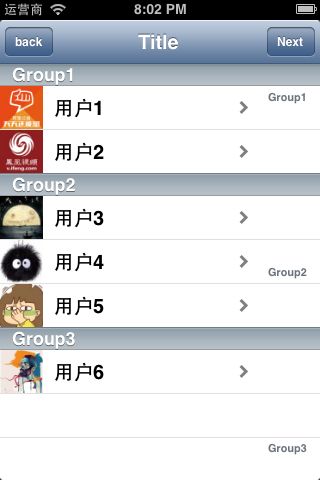IOS之表视图添加索引
我们要实现的效果如下。

1.修改ControlView.h,即添加变量dict,用于存储TabelView的数据源。
- #import <UIKit/UIKit.h>
- @interface IkrboyViewController5 : UIViewController{
- NSMutableDictionary *dict;
- }
- @end
#import <UIKit/UIKit.h>
@interface IkrboyViewController5 : UIViewController{
NSMutableDictionary *dict;
}
@end
2.在ControlView.m添加如下修改
- - (void)viewDidLoad
- {
- [super viewDidLoad];
- [self initTableViewData];
- // Do any additional setup after loading the view.
- }
- -(void)initTableViewData{
- NSBundle *bundle = [NSBundle mainBundle];
- NSString *plistPath = [bundle pathForResource:@"user_head" ofType:@"plist"];
- NSArray *dataArr = [[NSArray alloc] initWithContentsOfFile:plistPath];
- //将所有数据分为三组
- NSMutableArray *arr1 = [NSMutableArray array];
- NSMutableArray *arr2 = [NSMutableArray array];
- NSMutableArray *arr3 = [NSMutableArray array];
- dict = [NSMutableDictionary dictionary];
- [dict setObject:arr1 forKey:@"Group1"];
- [dict setObject:arr2 forKey:@"Group2"];
- [dict setObject:arr3 forKey:@"Group3"];
- //设置划分数据的依据,即根据index分三组,index为0-1的为第一组,2-4为第二组,5为第三组
- for(NSInteger index = 0; index < [dataArr count]; index++){
- NSDictionary *item = [dataArr objectAtIndex:index];
- if(index<2){
- [arr1 addObject:item];
- }
- else if(index>=2&&index<5){
- [arr2 addObject:item];
- }
- else if(index>=5){
- [arr3 addObject:item];
- }
- }
- }
- (void)viewDidLoad
{
[super viewDidLoad];
[self initTableViewData];
// Do any additional setup after loading the view.
}
-(void)initTableViewData{
NSBundle *bundle = [NSBundle mainBundle];
NSString *plistPath = [bundle pathForResource:@"user_head" ofType:@"plist"];
NSArray *dataArr = [[NSArray alloc] initWithContentsOfFile:plistPath];
//将所有数据分为三组
NSMutableArray *arr1 = [NSMutableArray array];
NSMutableArray *arr2 = [NSMutableArray array];
NSMutableArray *arr3 = [NSMutableArray array];
dict = [NSMutableDictionary dictionary];
[dict setObject:arr1 forKey:@"Group1"];
[dict setObject:arr2 forKey:@"Group2"];
[dict setObject:arr3 forKey:@"Group3"];
//设置划分数据的依据,即根据index分三组,index为0-1的为第一组,2-4为第二组,5为第三组
for(NSInteger index = 0; index < [dataArr count]; index++){
NSDictionary *item = [dataArr objectAtIndex:index];
if(index<2){
[arr1 addObject:item];
}
else if(index>=2&&index<5){
[arr2 addObject:item];
}
else if(index>=5){
[arr3 addObject:item];
}
}
}
3.初始化TableView
- //分为多少个分组
- - (NSInteger)numberOfSectionsInTableView:(UITableView *)tableView
- {
- return [[dict allKeys] count];
- }
- //每个分组的数据单元个数
- - (NSInteger)tableView:(UITableView *)tableView numberOfRowsInSection:(NSInteger)section
- {
- switch(section)
- {
- case 0:
- {
- return [[dict objectForKey:@"Group1"] count];
- }
- case 1:
- {
- return [[dict objectForKey:@"Group2"] count];
- }
- case 2:
- {
- return [[dict objectForKey:@"Group3"] count];
- }
- }
- return 0;
- }
- //分组的标题,不实现下面的方法,不显示分组标题
- - (NSString *)tableView:(UITableView *)tableView titleForHeaderInSection:(NSInteger)section
- {
- //dict allKeys取出的key arr无顺序,需进行排序
- NSArray *arr = [[dict allKeys] sortedArrayUsingSelector:@selector(compare:)];
- return [arr objectAtIndex:section];
- }
- //列表右侧的索引提示,不实现下面的方法,不显示右侧索引
- -(NSArray *) sectionIndexTitlesForTableView: (UITableView *) tableView
- {
- //dict allKeys取出的key arr无顺序,需进行排序
- NSArray *arr = [[dict allKeys] sortedArrayUsingSelector:@selector(compare:)];
- return arr;
- }
- - (UITableViewCell *)tableView:(UITableView *)tableView cellForRowAtIndexPath:(NSIndexPath *)indexPath
- {
- static NSString *CellIdentifier = @"myTableCell";
- UITableViewCell *cell = [tableView dequeueReusableCellWithIdentifier:CellIdentifier];
- NSUInteger row = [indexPath row];
- NSUInteger section = [indexPath section];
- NSArray *arr;
- switch (section) {
- case 0:
- arr = [dict objectForKey:@"Group1"];
- break;
- case 1:
- arr = [dict objectForKey:@"Group2"];
- break;
- case 2:
- arr = [dict objectForKey:@"Group3"];
- break;
- default:
- break;
- }
- NSDictionary *rowDict = [arr objectAtIndex:row];
- cell.textLabel.text = [rowDict objectForKey:@"itemName"];
- NSLog(@"cell.label.text = %@",[rowDict objectForKey:@"itemName"]);
- NSString *imagePath = [rowDict objectForKey:@"itemImagePath"];
- cell.imageView.image = [UIImage imageNamed:imagePath];
- NSLog(@"cell.image.image = %@",imagePath);
- cell.accessoryType = UITableViewCellAccessoryDisclosureIndicator;
- return cell;
- }
- //选中Cell响应事件
- - (void)tableView:(UITableView *)tableView didSelectRowAtIndexPath:(NSIndexPath *)indexPath{
- [tableView deselectRowAtIndexPath:indexPath animated:YES];//选中后的反显颜色即刻消失
- NSUInteger row = [indexPath row];
- NSUInteger section = [indexPath section];
- NSArray *arr;
- switch (section) {
- case 0:
- arr = [dict objectForKey:@"Group1"];
- break;
- case 1:
- arr = [dict objectForKey:@"Group2"];
- break;
- case 2:
- arr = [dict objectForKey:@"Group3"];
- break;
- default:
- break;
- }
- NSDictionary *rowDict = [arr objectAtIndex:row];
- NSString *userName = [rowDict objectForKey:@"itemName"];
- NSLog(@"userName=%@",userName);
- }
//分为多少个分组
- (NSInteger)numberOfSectionsInTableView:(UITableView *)tableView
{
return [[dict allKeys] count];
}
//每个分组的数据单元个数
- (NSInteger)tableView:(UITableView *)tableView numberOfRowsInSection:(NSInteger)section
{
switch(section)
{
case 0:
{
return [[dict objectForKey:@"Group1"] count];
}
case 1:
{
return [[dict objectForKey:@"Group2"] count];
}
case 2:
{
return [[dict objectForKey:@"Group3"] count];
}
}
return 0;
}
//分组的标题,不实现下面的方法,不显示分组标题
- (NSString *)tableView:(UITableView *)tableView titleForHeaderInSection:(NSInteger)section
{
//dict allKeys取出的key arr无顺序,需进行排序
NSArray *arr = [[dict allKeys] sortedArrayUsingSelector:@selector(compare:)];
return [arr objectAtIndex:section];
}
//列表右侧的索引提示,不实现下面的方法,不显示右侧索引
-(NSArray *) sectionIndexTitlesForTableView: (UITableView *) tableView
{
//dict allKeys取出的key arr无顺序,需进行排序
NSArray *arr = [[dict allKeys] sortedArrayUsingSelector:@selector(compare:)];
return arr;
}
- (UITableViewCell *)tableView:(UITableView *)tableView cellForRowAtIndexPath:(NSIndexPath *)indexPath
{
static NSString *CellIdentifier = @"myTableCell";
UITableViewCell *cell = [tableView dequeueReusableCellWithIdentifier:CellIdentifier];
NSUInteger row = [indexPath row];
NSUInteger section = [indexPath section];
NSArray *arr;
switch (section) {
case 0:
arr = [dict objectForKey:@"Group1"];
break;
case 1:
arr = [dict objectForKey:@"Group2"];
break;
case 2:
arr = [dict objectForKey:@"Group3"];
break;
default:
break;
}
NSDictionary *rowDict = [arr objectAtIndex:row];
cell.textLabel.text = [rowDict objectForKey:@"itemName"];
NSLog(@"cell.label.text = %@",[rowDict objectForKey:@"itemName"]);
NSString *imagePath = [rowDict objectForKey:@"itemImagePath"];
cell.imageView.image = [UIImage imageNamed:imagePath];
NSLog(@"cell.image.image = %@",imagePath);
cell.accessoryType = UITableViewCellAccessoryDisclosureIndicator;
return cell;
}
//选中Cell响应事件
- (void)tableView:(UITableView *)tableView didSelectRowAtIndexPath:(NSIndexPath *)indexPath{
[tableView deselectRowAtIndexPath:indexPath animated:YES];//选中后的反显颜色即刻消失
NSUInteger row = [indexPath row];
NSUInteger section = [indexPath section];
NSArray *arr;
switch (section) {
case 0:
arr = [dict objectForKey:@"Group1"];
break;
case 1:
arr = [dict objectForKey:@"Group2"];
break;
case 2:
arr = [dict objectForKey:@"Group3"];
break;
default:
break;
}
NSDictionary *rowDict = [arr objectAtIndex:row];
NSString *userName = [rowDict objectForKey:@"itemName"];
NSLog(@"userName=%@",userName);
}


